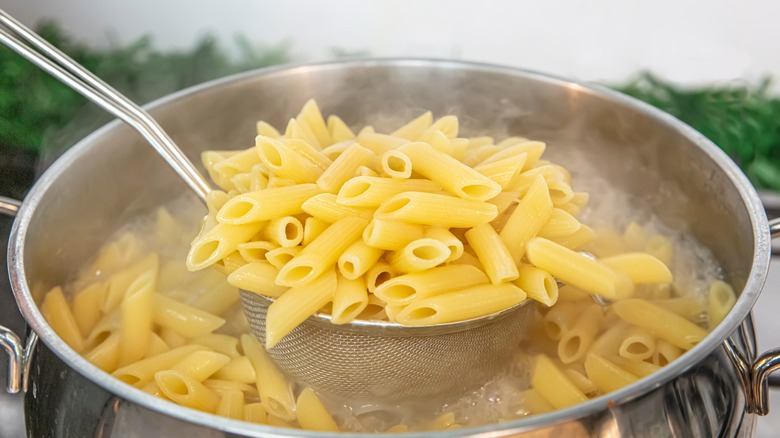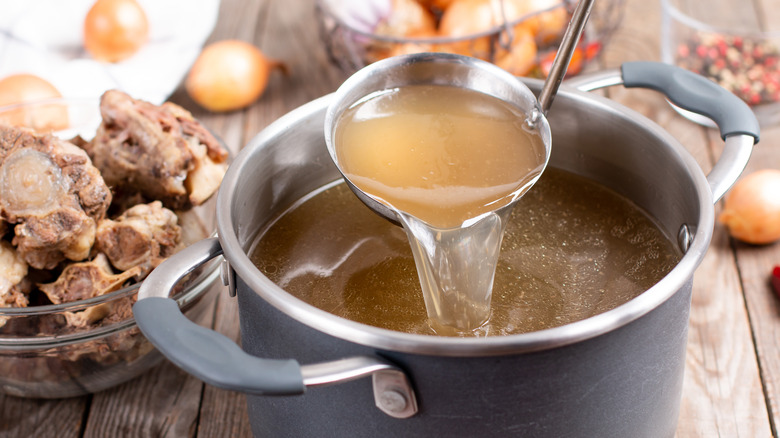Cook Your Pasta In Chicken Broth To Give It A Unique Kick Of Flavor
Boiling pasta is a requirement. One of the first steps to make pasta involves boiling it in plain, salted water. But, if we're being honest, pasta boiled in water doesn't have much flavor. It tastes like a wet noodle — bland, neutral, and inoffensive. Most of the flavor of a pasta dish usually comes from the sauce or toppings. The pasta is a flavorless vessel for holding tomato sauce, butter, cheese, and other ingredients.
If you've found your pasta has been a little too bland and you've been relying on the sauce for flavor, here's a trick you should know. Boiling your pasta in chicken stock gives your pasta (and the resulting dish) more flavor. Feel free to experiment with any type you like, such as beef, vegetable, or even turkey. Chicken stock lends cooked pasta a subtle, somewhat meaty flavor that won't overwhelm the rest of your ingredients. If you're unconvinced, one example of this method is chicken noodle soup, which is basically noodles, chicken, and vegetables cooked together in chicken stock.
Although the taste of stock-boiled pasta isn't overly pronounced, it's best to save this trick for dishes that don't require a heavier sauce or numerous toppings. However, it may not hurt to experiment anyway — especially once you learn how using stock may make your recipes more nutritious.
Stock is known to be full of minerals and vitamins
According to Medical News Today, broths and stocks are known for having a high mineral and vitamin content, albeit with a slight difference: Stock has more fats, proteins, and carbohydrates than broth. In particular, stock contains vitamin B, potassium, and riboflavin. It's also credited for assisting weight loss, improving sleep, and promoting joint and intestinal health.
Chicken stock is perhaps most commonly known for easing symptoms of minor illnesses like the common cold or flu. Although your grandparents may have told you chicken soup can cure a common cold when you were younger, it's not all myth. Chicken stock — and other warm liquids — are said to reduce some symptoms of a cold, such as inflammation, sore throats, and other minor aches and pains, per one study published in the National Library of Medicine. Therefore, boiling pasta in chicken stock gives it extra flavor and makes it somewhat more nutritious, especially if you're sick. Of course, you can't live off chicken stock and noodles alone, but you can't deny its inherently cozy nature either.
However, another liquid pairs well with pasta and is believed to have some surprising health benefits — red wine.
Red wine improves the flavor and texture of cooked pasta
You may know red wine and pasta are a common pairing, but you may not have known that you can cook pasta in red wine too. According to Reader's Digest recipe writer Jim Mumford, cooking pasta in red wine isn't only a tradition that dates back centuries, but wine also enhances the pasta's flavor and texture. The flavors of red wine get absorbed into the pasta while it cooks, while its acidity helps it finish cooking, resulting in a silkier texture than boiling it in plain, salted water would accomplish. This makes wine-cooked pasta especially good for dishes like spaghetti or lasagna, where tomato-based sauces can help complement the boldness of a full-bodied red.
If you aim to get some health benefits from your weeknight pasta favorites, then we have good news. According to The Mayo Clinic, red wine is full of antioxidants, which improve heart health. It also contains resveratrol, which is popularly theorized to improve the function and health of blood vessels. So, as long as you enjoy it in moderation, some red wine in your pasta dinner can be delicious and potentially good for your heart.
Whether you boil your pasta in chicken stock, red wine, or plain water, you should learn how to upgrade basic sauces to ensure even the simplest pasta recipes are as flavorful as possible.


